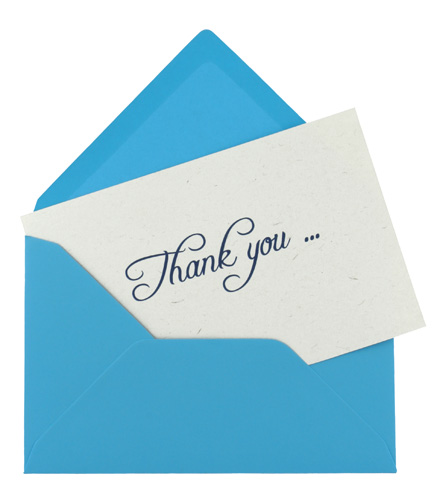BY TOM COX | BUSINESS TIPS CONTRIBUTOR
 One of my most popular articles is “Three Steps to Writing a Perfect Thank You Note.” If you already write thank-you notes regularly, it’s a great reminder of the basics. For the rest of us who don’t, it provides a simple checklist that lets us dramatically increase the likelihood we’ll offer thanks in writing — and in the process, we’ll discover we’re making huge investments in our relationships. Here’s a fresh take on the topic, with some guidance on avoiding common errors.
One of my most popular articles is “Three Steps to Writing a Perfect Thank You Note.” If you already write thank-you notes regularly, it’s a great reminder of the basics. For the rest of us who don’t, it provides a simple checklist that lets us dramatically increase the likelihood we’ll offer thanks in writing — and in the process, we’ll discover we’re making huge investments in our relationships. Here’s a fresh take on the topic, with some guidance on avoiding common errors.
BY TOM COX | BUSINESS TIPS CONTRIBUTOR
 One of my most popular articles is “Three Steps to Writing a Perfect Thank You Note.” If you already write thank-you notes regularly, it’s a great reminder of the basics. For the rest of us who don’t, it provides a simple checklist that lets us dramatically increase the likelihood we’ll offer thanks in writing — and in the process, we’ll discover we’re making huge investments in our relationships. Here’s a fresh take on the topic, with some guidance on avoiding common errors.
One of my most popular articles is “Three Steps to Writing a Perfect Thank You Note.” If you already write thank-you notes regularly, it’s a great reminder of the basics. For the rest of us who don’t, it provides a simple checklist that lets us dramatically increase the likelihood we’ll offer thanks in writing — and in the process, we’ll discover we’re making huge investments in our relationships. Here’s a fresh take on the topic, with some guidance on avoiding common errors.
Thank-You Notes Matter
Written thank-you notes matter. A lot. One of the management thinkers I most admire is Mark Horstman of Manager Tools. On a recent visit he confided that he keeps every written thank-you note he’s ever gotten. Whenever he gets down or feels the need for inspiration, he re-reads a few. What a great way to use the thank-you notes we get. What a great reminder of how powerful it is to send them.
Own Your Impact
To be a good leader, you need to be effective and intentional about the way you make other people feel. Whatever impact you end up making, you should do it on purpose. Or as the saying goes, “a well bred person never hurts anybody… accidentally.” When you step up to being a CEO or a leader, you need to master the basics. Look people in the eye. Shake their hand firmly. Listen like they’re the most important person in the world at that moment. Feel, and then show, sincere appreciation. However it’s easy when you’re new at this to do it badly. If your thank-you seems insincere, you can seem manipulative. That’s bad — it undermines the relationship you’re trying to build.
Sincere Appreciation
Sincerity is crucial. Stop and really notice what you’re grateful for. One of my most common pieces of advice to CEOs and aspiring managers is, end each day by writing down your victories and at least one thing for which you are grateful. I call this your Victory Journal:
When you notice what you are grateful for, it makes you happier and helps re-wire your brain to notice the good things happening in your life.
When you feel honestly grateful, you can share that feeling honestly. Sadly, most of us aren’t practicing gratitude. We end the day looking at our to-do list and focusing on what we didn’t do. We focus on the extra work of tomorrow, caused by what went wrong today. Therefore, cultivate a mindset of sincere appreciation. A few years ago in Beaverton I got such consistently great service at one restaurant on three different visits, that I finally insisted on seeing the manager. Turns out he was a traveling restaurant trouble-shooter who makes his living by boosting service. He was obviously very good. I asked him his secrets. Here’s one: “I honestly appreciate it when people show up for their shifts, and I express it. I’m enthusiastic, appreciative, and grateful,” he said. But… you pay them to show up. Isn’t that enough? Why make a big deal of it? (My clients say this sort of silly thing all the time — I was dying to hear his response.) “No, paying them isn’t enough. Many times I’ve had to scramble to cover a shift, when someone didn’t show up. When you show up, I don’t have to do that, and remembering it makes it easy for me to be sincere in my appreciation,” he said. I pressed him further and he admitted he deliberately cultivated this mindset. ”Ultimately, how I treat them in the back of the restaurant, is how they’ll treat you in the front.” I once helped a new manager avoid being fired in his first 90 days. He didn’t think any of his people did things right. He focused on their mistakes, and it quickly hurt morale. His boss and I gave him an assignment — to deliberately notice one thing each day that each of his people was doing right. He had to write it down and share it with us both via email — the date, time, location, person, and exactly what behavior he observed. He struggled for three weeks, and finally got the hang of it — and it dramatically improved his rapport with his staff. Cultivate the mindset of gratitude. Notice good things. Only when you notice them, can you appreciate them.
Specificity Breeds Credibility
Here’s a bad thank-you — one that can easily be interpreted as insincere:
“Dear Fred – Great work yesterday – keep it up! -Tom”
Even if the recipient believes you, they don’t know what they did right, because you don’t say. Vague praise comes across as insincere. Here’s the outline for a perfect thank-you note.
Three Sincere Sentences
A sincere thank-you will make these three points, in this order:
- (observation): the OBSERVABLE thing they did
- (impact): how their behavior had a positive impact
- (appreciation): state your appreciation of their character as revealed by their behavior
Here’s how to make each point.
Observation
Start by anchoring the thank-you with the event and by reminding them of their behavior, by describing it from your perspective. These should almost always involve one or more of the five senses. Sight and hearing are most common in business, but all of them can work.
- Touch: your warm handshake. The feel of the product in my hand.
- Vision: you looked me in the eye and smiled. You cleaned the floor, and I saw the result. You closed the sale and I saw the customer order.
- Smell: the aroma of the food you brought in for us. You bought me a new car and I smelled the new-car smell.
- Taste: food or beverage are most likely here.
- Hearing: what someone said, the sound of music, or someone’s voice. The customer on the phone who complimented our service.
- Time: the length of time they invested in meeting with you.
Examples – “Last Tuesday at the Rotary lunch, you met me at the door with a firm handshake, and you looked me in the eye and smiled.” Or, “Yesterday I got to watch as my son opened the present you sent him.” Note – you cannot fake the observation. If someone is uncomfortable with being praised — or if they doubt your sincerity — a weak or vague Observation sentence will give them the opening to discount the entire thank-you, and maybe discount your leadership.
Impact
Here you must build on the Observation and explain what impact their action had (on you or on someone else). I typically use the word “feel” when describing impact, though any outcome or result is fine. Examples – “You really made me feel welcome.” Or, “I wish you could have seen their smiles.”
Appreciation
Express your sincere feeling of gratitude. If you can, look deep into the other person and find the character trait that underlies their action. Start with “generosity” and see if you can find some other word that’s even more appropriate. This is the place where you say “thank you.” Examples – “Your Rotary is fortunate to have so warm-hearted a member as you, and I’m grateful to have your friendship.” Or, “I know the kids appreciate how loving and caring you are – as do I.”
Examples
In these examples, the key elements are highlighted.
Tom Cox is a Portland area consultant and executive coach. He helps leaders exceed their business aspirations.



